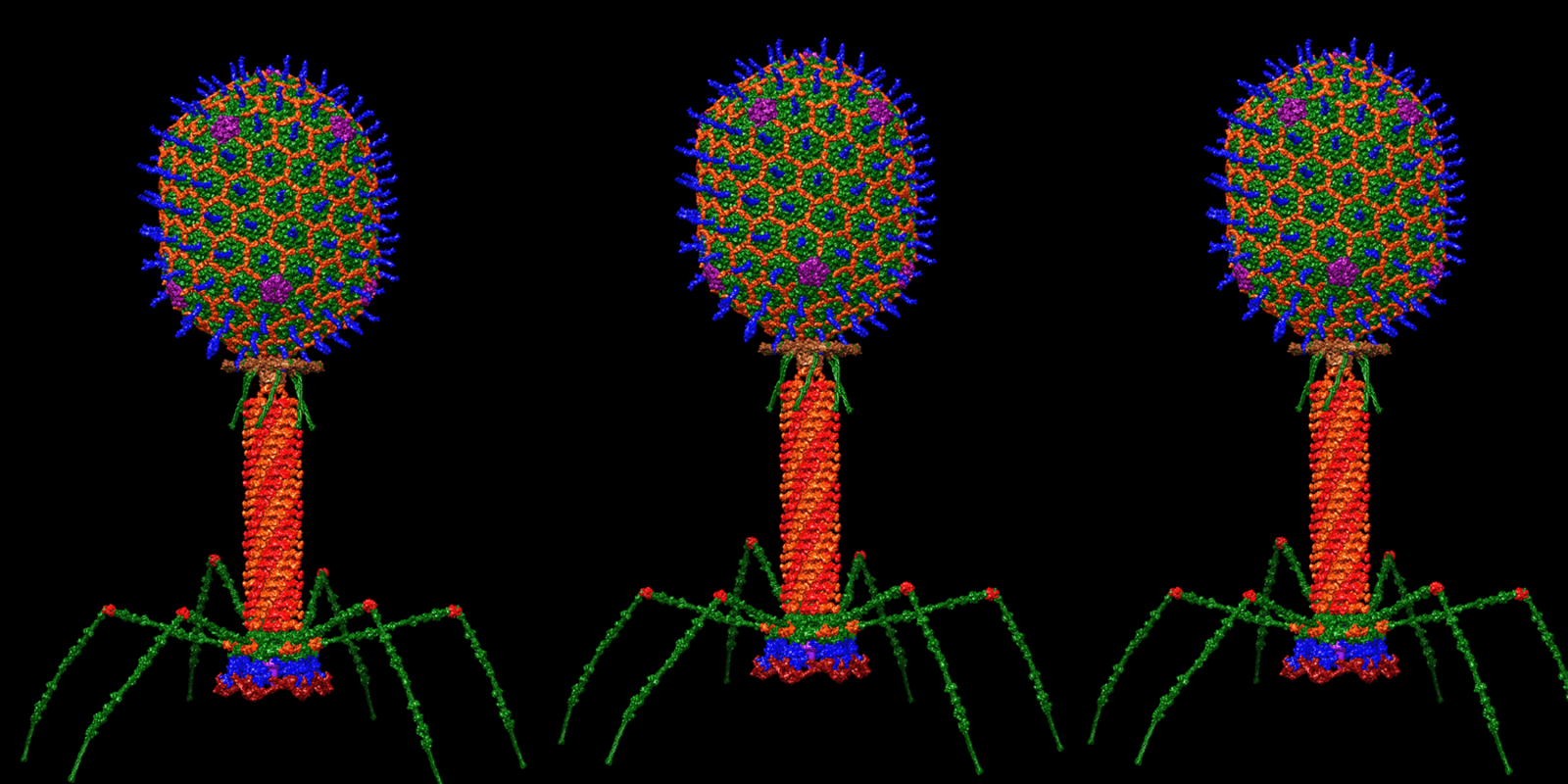


Behe: Bacteriophage—The New Poster Child for Darwin’s Doom
On today’s ID the Future, Lehigh University biologist Michael Behe argues that Darwinism was built on a foundation of ignorance. Through no fault of Darwin’s, neither he nor anyone else in his day had a clue about the nature of cellular life and biological information, says Behe. Even the biologists of the Neo-Darwinian synthesis in the first half of the twentieth century were fairly clueless about the foundation of life, Behe says. When researchers did finally begin to unravel the sophisticated foundations of life, earlier notions of how evolutionary processes might have invented the great diversity of life forms on earth were exposed as causally inadequate. Behe says that in fact all the attempts to rescue the idea of mindless macroevolution have been exposed as inadequate by our growing understanding of molecular biology, but evolutionary theory blithely sails along anyway, thanks to institutional inertia. A key defeater of the theory, Behe says, is captured by his concept of irreducible complexity. He explains the idea with a simple illustration, a mousetrap, and then applies it to a marvelous molecular machine that researchers have only recently come to appreciate, the Escherichia virus T4 bacteriophage. As he argues, this bacteriophage powerfully bespeaks the purposeful arrangement of parts, rather than mindless evolutionary processes. The occasion for his conversation with host Casey Luskin is his contribution to the recent Harvest House anthology, The Comprehensive Guide to Science and Faith. Image Credit: Dr. Victor Padilla-Sanchez: Atomic structural model of bacteriophage T4 in UCSF Chimera software using pdbs of the individual proteins.

How Universal Common Descent Survives Failed Predictions
On today’s ID the Future, philosopher of biology Paul Nelson discusses his chapter in a recent Harvest House anthology edited by host Casey Luskin, The Comprehensive Guide to Science and Faith. Nelson says the theory of universal common descent, a key component of modern evolutionary theory, has generated multiple predictions that have failed. The prediction he discusses here is that there would turn out to be a single universal genetic code, since that’s what we should expect if all life on earth is descended from the last universal common ancestor (LUCA). Findings over the past three decades have proven that prediction spectacularly wrong. How does the theory of universal common descent shrug off this contrary empirical finding? The trick for LUCA in this and similar cases is to shift blame for failure to an ancillary theory. It’s a clever move, says Nelson, but it comes at a cost.

Life: Fearfully and Wonderfully Fine Tuned
Today’s ID the Future spotlights the incredible fine tuning of life. Robert J. Marks hosts Stockholm University professor of mathematical statistics Ola Hössjer and University of Miami population geneticist Daniel Díaz. The three discuss strategies for extending the concept of fine tuning to biological systems, and along the way touch on population genetics, entropy, and probability theory. At the center of the discussion are three technical papers—here, here, and here—each co-authored by one or more of the three members of today’s podcast discussion. This episode is reposted with permission from Mind Matters News, a website of Discovery Institute’s Walter Bradley Center for Natural and Artificial Intelligence. Head over to their podcast site to find the other episodes in this interview series.

Physicist Brian Miller Talks Nanotech, Origin of Life, and Area 51
On today’s ID the Future physicist Brian Miller and host Eric Anderson continue their exploration of a recent conversation between origin-of-life investigators Jeremy England and Paul Davies on Justin Brierley’s Unbelievable? radio show. Miller begins with a quick flyover of the many nanotechnologies essential to even to the simplest viable cell. A minimally complex cell is vastly more sophisticated than our best human nanotechnology. What about England’s insistence that real progress has been made in origin-of-life studies since the 1950s? True, Anderson says, but the progress has been principally in better understanding how the simplest cells function, and in figuring out what doesn’t work to blindly evolve life from non-life. That is, the direction of discovery has been to throw cold water on one idea after another for the naturalistic origin of life. Miller then makes an even bolder statement. All the physics for us to have known this were in place more than a hundred years ago. The origin-of-life community just chose to ignore it, perhaps because they were dogmatically wedded to finding a purely materialistic explanation for the origin of the first life. To show why that’s misguided, Miller offers an illustrative story: Imagine that what looks for all the world like an alien spaceship is discovered in the desert. Two groups of scientists decide on radically different approaches to understanding the workings of this mysterious object. Tune in to hear the rest of the story.

The Origin of Life was the Origin of an Engineering Marvel
On today’s ID the Future, physicist Brian Miller touches on various challenges facing the origin of the first life. He and host Eric Anderson discuss Jeremy England’s origin-of-life ideas and the RNA World Hypothesis, and offer multiple reasons why they are convinced that various proposed mindless processes do not explain the origin of the first self-reproducing cell. Miller urges another approach, one that draws on engineering principles and embraces the evidence in even the simplest cell of highly intelligent engineering.

Michael Behe’s Mousetrap on the Edge
On this ID the Future Lehigh University biologist Michael Behe dives deeper into A Mousetrap for Darwin. Behe and host Eric Anderson pivot to the new book’s section defending Behe’s earlier work, The Edge of Evolution. In that earlier book, Behe reviewed hard data from evolution studies of malaria parasites, HIV, and E. coli, showed that blind evolutionary processes face severe limits as to what they can build, and argued that intelligent design was required for the origin of life’s great diversity. In this new conversation Behe touches on some of the attempts to refute that argument and suggests why those refutations fail. For a more in-depth look at his defense of The Edge of Evolution, get your copy of A Mousetrap for Darwin: Michael J. Behe Answers His Critics and check out Part 3 of the book.

James Tour and Brian Miller Talk Engines We Can’t Live Without
Today’s ID the Future features Part 1 of an extended interview that first appeared on a podcast show hosted by distinguished Rice University synthetic organic chemist James M. Tour. As he typically does, since it’s the Science & Faith podcast, Dr. Tour begins his show by asking his guest for a statement of faith. Miller, a Christian, gives his, and then they dive into origin-of-life science. In a surprisingly accessible discussion given the depth of the material, the pair cover a range of issues—thermodynamics and the origin of the first cell, entropy, free energy, order and disorder, molecular engines, non-equilibrium thermodynamics, and the need for engines and information to overcome the vicissitudes of entropy. Also in the mix—feedback loops, Jeremy England, and much more.

Carbon Valley Trumps Silicon Valley
On this episode of ID the Future from the vault, we hear from two contributors to the Crossway anthology, Theistic Evolution: A Scientific, Philosophical, and Theological Critique, Molecular biologist Douglas Axe and philosopher of science Stephen Meyer explain how Carbon Valley Trumps Silicon Valley, and shouts intelligent design. They compare some of today’s technological marvels to living technology, and show how even “simple cells” far exceed even the best silicon valley has to offer.

Of Natural Selection, Explanatory Deficits, and Bunnies Dark and Light
On this episode of ID the Future we hear the first part of Discovery Institute Education Outreach Associate Daniel Reeves’ talk at the 2020 Dallas Science and Faith Conference. Reeves outlines the meaning of natural selection, and traces its history, starting from Darwin’s early understanding, in the days when cells were viewed as just blobs of protoplasm. Reeves carries the story from there through the neo-Darwinian modern synthesis and into the extended evolutionary synthesis, culminating in a 2016 meeting of the Royal Society on the theory’s continuing — and still unresolved — explanatory deficits.